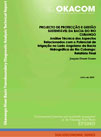 In 1994, the three
riparian countries of the Okavango River Basin – Angola, Botswana and
Namibia -- agreed to plan for collaborative management of the natural
resources of the Okavango, forming the Permanent Okavango River Basin
Water Commission (OKACOM). In 2003, through the Global Environment
Facility, OKACOM launched the Environmental Protection and Sustainable
Management of the Okavango River Basin (EPSMO) Project, fulfilling the
promise to create a base of reliable information to be used in the
Commission’s decision making.
In 1994, the three
riparian countries of the Okavango River Basin – Angola, Botswana and
Namibia -- agreed to plan for collaborative management of the natural
resources of the Okavango, forming the Permanent Okavango River Basin
Water Commission (OKACOM). In 2003, through the Global Environment
Facility, OKACOM launched the Environmental Protection and Sustainable
Management of the Okavango River Basin (EPSMO) Project, fulfilling the
promise to create a base of reliable information to be used in the
Commission’s decision making.
The Okavango River Basin is unusual in that its waters and shores
are relatively pristine, protected for many years by low human
populations and, in its upper reaches, by a long war in Angola.
Experience throughout the world has shown that remedial action is
invariably more costly than wise management.
OKACOM designed the EPSMO Project to evaluate the condition of the
river basin, to identify possible threats posed by increasing demands
on the benefits of the river system and to develop a program of policy,
legal and institutional reforms – a Strategic Action Plan (SAP)-- to
meet and manage these demands.
In accordance with GEF methodology, development of the SAP will be
informed by a Transboundary Diagnostic Analysis (TDA), a scientific and
technical fact-finding analysis that seeks to identify the causal
chains and root causes of problems affecting (or with the potential to
affect) the integrity of the Okavango River Basin.
The long-term objective of the EPSMO Project is to achieve global
environmental benefits through concerted management of the naturally
integrated land and water resources of the Okavango River Basin.







 In 1994, the three
riparian countries of the Okavango River Basin – Angola, Botswana and
Namibia -- agreed to plan for collaborative management of the natural
resources of the Okavango, forming the Permanent Okavango River Basin
Water Commission (OKACOM). In 2003, through the Global Environment
Facility, OKACOM launched the Environmental Protection and Sustainable
Management of the Okavango River Basin (EPSMO) Project, fulfilling the
promise to create a base of reliable information to be used in the
Commission’s decision making.
In 1994, the three
riparian countries of the Okavango River Basin – Angola, Botswana and
Namibia -- agreed to plan for collaborative management of the natural
resources of the Okavango, forming the Permanent Okavango River Basin
Water Commission (OKACOM). In 2003, through the Global Environment
Facility, OKACOM launched the Environmental Protection and Sustainable
Management of the Okavango River Basin (EPSMO) Project, fulfilling the
promise to create a base of reliable information to be used in the
Commission’s decision making.
 Events
Events  GEF IW:LEARN
GEF IW:LEARN